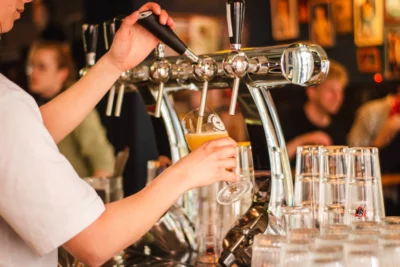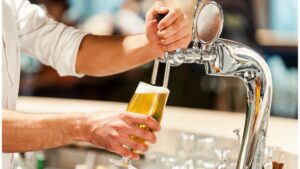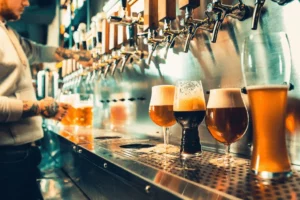Have you ever found yourself wondering, “What Time Do They Stop Selling Alcohol In Georgia?” It’s a common query for both residents and visitors to the Peach State. Knowing the rules and regulations surrounding alcohol sales is vital whether you’re planning a night out, stocking up for a gathering, or just curious about the alcohol sale hours in Georgia.
So, let’s dive into the details of Georgia’s alcohol sale regulations and find out at what time they stop selling alcohol in the state.
What Time Do They Stop Selling Alcohol In Georgia?
The sale of alcohol in Georgia, United States, is subject to certain regulations regarding the hours during which it can be sold. These regulations may vary depending on the type of alcoholic beverage and the specific locality within Georgia. Generally, here are some common rules for alcohol sales in Georgia:
- Beer and Wine: In most areas of Georgia, beer and wine can be sold in retail stores and supermarkets until 11:45 PM from Monday through Saturday. On Sundays, beer and wine sales may begin later in the morning, typically around 12:30 PM, and can continue until 11:45 PM.
- Spirits (Hard Liquor): The sale of distilled spirits, such as whiskey, vodka, and rum, is regulated by the Georgia Department of Revenue and is subject to stricter hours. In most areas, sales of spirits must cease at 11:45 PM from Monday through Saturday. However, the sale of spirits is not allowed on Sundays, except in certain areas where local referendums have permitted Sunday sales.
- Local Variations: It’s important to note that specific counties and municipalities in Georgia may have their own ordinances and regulations regarding alcohol sales, including variations in hours. Some areas may have more lenient or restrictive hours, and some may allow Sunday alcohol sales, while others do not.
Since alcohol regulations can change over time, I strongly recommend checking with the local alcohol control authorities or the specific establishment where you plan to purchase alcohol for the most up-to-date information regarding alcohol sale hours in Georgia.
Importance of knowing alcohol sale hours
Knowing alcohol sale hours is important for several reasons, as it helps ensure responsible alcohol consumption and maintains public safety. Here are some key reasons why it’s important to be aware of alcohol sale hours:
- Responsible drinking: Understanding the legal hours for alcohol sales helps individuals plan their alcohol consumption responsibly. It prevents excessive or binge drinking, which can lead to health issues, accidents, and public disturbances.
- Public safety: Restricting the sale of alcohol during certain hours can help reduce the likelihood of alcohol-related accidents and incidents, such as drunk driving, fights, and public disturbances. These restrictions contribute to overall public safety.
- Reducing alcohol-related harm: Limiting the availability of alcohol during certain hours can mitigate the social and health consequences of excessive drinking. It may help reduce alcohol-related crimes, violence, and injuries.
- Encouraging moderation: Knowledge of alcohol sale hours encourages people to consume alcohol in moderation and discourages excessive drinking. This promotes healthier drinking habits and reduces the risk of alcohol addiction and related health problems.
- Community harmony: Alcohol sale hour regulations can help maintain peace and harmony in residential areas. By limiting the hours during which alcohol can be sold, communities can reduce disturbances and noise associated with late-night alcohol consumption.
- Compliance with the law: Knowing the legal hours for alcohol sales ensures that individuals and businesses comply with local alcohol regulations. Failure to adhere to these laws can result in fines, license revocation, and legal consequences.
- Economic impact: Understanding alcohol sale hours is also important for businesses in the alcohol industry, as they need to plan their operations and staffing accordingly. Knowing the hours helps them serve their customers while complying with the law.
- Consistency and predictability: Consistent alcohol sale hours provide predictability for both consumers and businesses. People can plan their social activities, and businesses can establish routines and schedules based on these hours.
- Preventing underage drinking: Enforcing specific alcohol sale hours can help deter underage individuals from attempting to purchase alcohol illegally during prohibited times.
- Supporting public health efforts: Knowledge of alcohol sale hours aligns with broader public health efforts to reduce alcohol-related harm. These measures contribute to healthier communities and fewer alcohol-related issues.
Different rules for various types of alcohol
Rules and regulations governing the sale and consumption of alcohol can vary significantly depending on the type of alcohol, the country, state, or region, and even the specific jurisdiction. Here are some common distinctions in rules for various types of alcohol:
- Beer:
-
- Alcohol Content: In many places, beer is subject to specific alcohol by volume (ABV) limits. There may be separate rules for regular beer, light beer, and high-alcohol craft beers.
- Sale Locations: Beer is often available for sale in a wide range of locations, including convenience stores, supermarkets, and liquor stores. Some areas allow breweries to sell beer directly to consumers on-site.
- Minimum Age: The legal drinking age for purchasing and consuming beer is typically consistent with other alcoholic beverages.
- Wine:
-
- Alcohol Content: Wines can vary significantly in alcohol content. Regulations may differentiate between still wines, sparkling wines, and fortified wines like port or sherry.
- Sale Locations: Wine is commonly sold in liquor stores, wine shops, and some grocery stores. In some places, wineries can sell their products directly to consumers.
- Labeling and Branding: Regulations often govern the labeling of wine bottles, including information about the origin, grape variety, and alcohol content.
- Spirits (Hard Liquor):
-
- Alcohol Content: Regulations often specify the maximum ABV for spirits. Different spirits may have varying limits.
- Sale Locations: Spirits are typically sold in dedicated liquor stores or government-run stores in many regions. Some places may allow bars and restaurants to sell bottles of spirits for off-premises consumption.
- Bottle Sizes: Regulations can dictate the sizes in which spirits are sold. For example, many countries have standardized bottle sizes for liquor.
- Craft and Artisanal Products:
-
- Microbreweries and Distilleries: Craft breweries and distilleries may have specific rules related to production, distribution, and sales. Some jurisdictions have introduced special licenses or exemptions to support these small-scale producers.
- Specialty Products: Regulations for specialty products like craft beer, small-batch spirits, and artisanal wines may differ from those for mass-produced equivalents.
- Licensing and Hours of Sale:
-
- Licensing: The type of license required to sell various types of alcohol can vary. For example, there may be different licenses for bars, restaurants, breweries, and liquor stores.
- Hours of Sale: The hours during which alcohol can be sold or served may differ for different types of establishments and alcohol types. Bars and nightclubs often have extended hours compared to liquor stores.
- Taxation and Pricing: Different types of alcohol may be subject to varying tax rates and pricing structures, which can impact their affordability and availability.
It’s important to note that the specific rules and regulations regarding the sale and consumption of alcohol can change over time and can be influenced by local laws, cultural norms, and public health considerations.
Therefore, individuals and businesses involved in the alcohol industry should stay informed about the relevant laws and regulations in their area to ensure compliance.
Penalties for Violating Alcohol Sale Hours
Penalties for violating alcohol sale hours can vary significantly depending on the jurisdiction and the specific circumstances of the violation. These penalties are typically enforced to discourage businesses and individuals from selling or consuming alcohol outside of the legally permitted hours.
Here are some common penalties that may be imposed for violating alcohol sale hours:
- Fines: The most common penalty for violating alcohol sale hours is the imposition of fines. The amount of the fine can vary widely depending on the jurisdiction, the severity of the violation, and whether it’s a first-time offense or a repeated violation. Fines can range from relatively small amounts to substantial sums.
- License Suspension or Revocation: In many cases, businesses that sell alcohol are required to obtain licenses to do so legally. Violating alcohol sale hours can result in the suspension or revocation of these licenses. The length of the suspension or whether the license is permanently revoked depends on local regulations and the severity of the violation.
- Criminal Charges: In some cases, especially for repeated or serious violations, individuals or businesses may face criminal charges. These charges can lead to more severe penalties, including probation, community service, or even imprisonment, depending on the jurisdiction and the circumstances.
- Community Service: As an alternative or in addition to fines or imprisonment, individuals who violate alcohol sale hours may be required to perform community service as a way to make amends for their actions and contribute positively to the community.
- Temporary Closure: In some cases, a business that repeatedly violates alcohol sale hours may be temporarily closed by authorities. This is often seen as a more severe penalty than fines or license suspension.
- Increased Scrutiny: After a violation, a business may face increased scrutiny from regulatory agencies, law enforcement, and the community. This can lead to closer monitoring and a more challenging operating environment.
- Civil Lawsuits: In addition to facing legal penalties, businesses or individuals who violate alcohol sale hours may also be vulnerable to civil lawsuits. For example, if an alcohol-related incident occurs as a result of the violation, victims may sue for damages.
- Loss of Reputation: Violating alcohol sale hours can harm the reputation of both individuals and businesses. This can lead to a loss of customers and trust within the community.
It’s essential to understand that the specific penalties for violating alcohol sale hours can vary significantly from one jurisdiction to another. Local, state, and national laws govern these penalties, and they can change over time.
Tips for Responsible Alcohol Purchasing
Responsible alcohol purchasing is essential to ensure the safety and well-being of yourself and those around you. Here are some tips to help you make responsible choices when buying alcohol:
- Know your limits:
-
- Understand your own tolerance for alcohol and set personal limits on how much you can safely consume in one sitting.
- Legal drinking age:
-
- Ensure you are of legal drinking age in your area before attempting to purchase alcohol. Selling or providing alcohol to minors is illegal in many places.
- Buy from licensed retailers:
-
- Purchase alcohol only from reputable and licensed retailers, such as liquor stores, bars, or restaurants. Avoid buying from unlicensed or illicit sources.
- Avoid excessive purchasing:
-
- Don’t buy more alcohol than you can consume responsibly. Avoid stockpiling or binge-buying alcohol, as it can lead to excessive consumption.
- Plan ahead:
-
- Before purchasing alcohol, plan how much you intend to drink and stick to your plan. Avoid impulse buying.
- Choose lower-alcohol options:
-
- Opt for lower-alcohol beverages when possible, such as light beer or wine with a lower alcohol by volume (ABV).
- Don’t drink and drive:
-
- Never purchase alcohol with the intention of consuming it and then driving. Always have a designated driver, use public transportation, or arrange for a ride-sharing service if you plan to drink.
- Be aware of alcohol content:
-
- Read labels to understand the alcohol content of the beverages you’re buying. This information is typically listed as ABV, which indicates the percentage of alcohol by volume.
- Monitor your budget:
-
- Consider your financial limits and don’t overspend on alcohol. It’s essential to maintain a balanced budget and prioritize your financial responsibilities.
- Be mindful of the occasion:
-
- Consider the context of your alcohol purchase. Celebratory occasions may warrant more alcohol, while regular weekdays should involve moderation.
- Responsible hosting:
-
- If you’re hosting an event or party where alcohol will be served, monitor your guests’ consumption and arrange for safe transportation options for those who may have had too much to drink.
- Understand the effects of alcohol:
-
- Educate yourself about the physical and psychological effects of alcohol. Understanding the risks and consequences of excessive consumption can help you make informed choices.
- Seek help if needed:
-
- If you or someone you know is struggling with alcohol dependence or addiction, seek help from a medical professional or a support group. Don’t hesitate to ask for assistance when necessary.
Remember that responsible alcohol purchasing and consumption are essential for your well-being and the safety of those around you. Always prioritize moderation and make informed choices when it comes to alcohol.
Encouragement for responsible alcohol consumption
Responsible alcohol consumption is a vital aspect of maintaining your health and well-being, as well as promoting safety for yourself and those around you.
Here’s some encouragement to help you make responsible choices when it comes to alcohol:
- Prioritize Your Health: Drinking in moderation and being mindful of your alcohol intake can contribute to your overall well-being. It helps you avoid the negative physical and mental health consequences associated with excessive drinking.
- Stay in Control: Responsible drinking allows you to stay in control of your actions and decisions. It can help you avoid making impulsive or regrettable choices that often accompany excessive alcohol consumption.
- Enjoy the Experience: Savor the flavors and social aspects of alcohol without overindulging. Responsible consumption can enhance your appreciation of different beverages and the company of friends and loved ones.
- Safety First: Responsible drinking keeps you and others safe. It reduces the risk of accidents, injuries, and harm to yourself and those around you, whether you’re at home, in a social setting, or on the road.
- Set a Positive Example: By practicing responsible alcohol consumption, you set a positive example for others, especially younger individuals who may look up to you. Your actions can influence those around you to make responsible choices as well.
- Embrace Balance: Life is about balance, and responsible drinking is a reflection of a balanced approach to life’s pleasures. It allows you to enjoy alcohol in moderation while maintaining a healthy and fulfilling lifestyle.
- Financial Well-being: Drinking in moderation can save you money. Overspending on alcohol can strain your finances, so responsible consumption helps you maintain financial stability.
- Quality Over Quantity: Focus on the quality of the alcohol you consume rather than the quantity. Savoring a fine wine or craft beer can be a more enjoyable and responsible experience than consuming large quantities of low-quality alcohol.
- Mindful Choices: Be mindful of when and why you choose to drink. Instead of using alcohol to cope with stress or negative emotions, seek healthier alternatives like exercise, meditation, or talking to a friend.
- Supportive Community: Surround yourself with friends and a community that encourages responsible drinking. Engaging with like-minded individuals can reinforce your commitment to moderation.
- Self-Respect: Responsible alcohol consumption can boost your self-esteem and self-respect. Knowing that you can enjoy alcohol without losing control or compromising your values can be empowering.
- Personal Growth: Practicing moderation and responsibility with alcohol can be a part of your personal growth journey. It shows that you’re committed to making positive choices in your life.
Conclusion
If you need to know more about What Time Do They Stop Selling Alcohol In Georgia, then you can get the information on this page. In Georgia, alcohol sales typically stop at 11:45 PM for off-premises consumption and at 2:00 AM for on-premises consumption, but these times may vary by location and type of alcohol establishment.
It’s important to check with local authorities or the specific venue for the most accurate and up-to-date information on alcohol sales hours.




